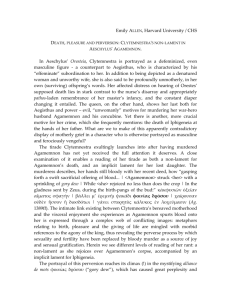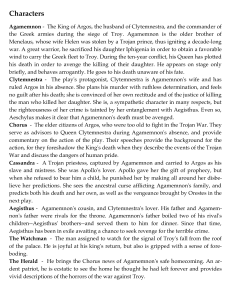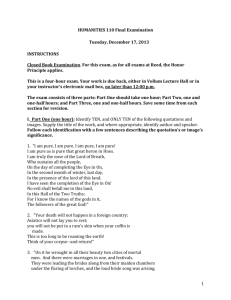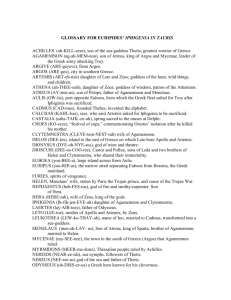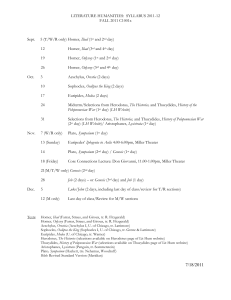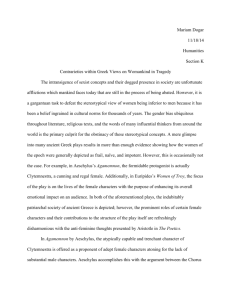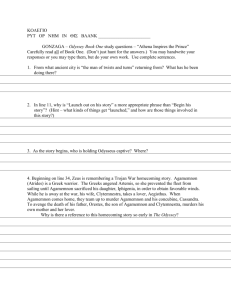Agamemnon 2.0
advertisement
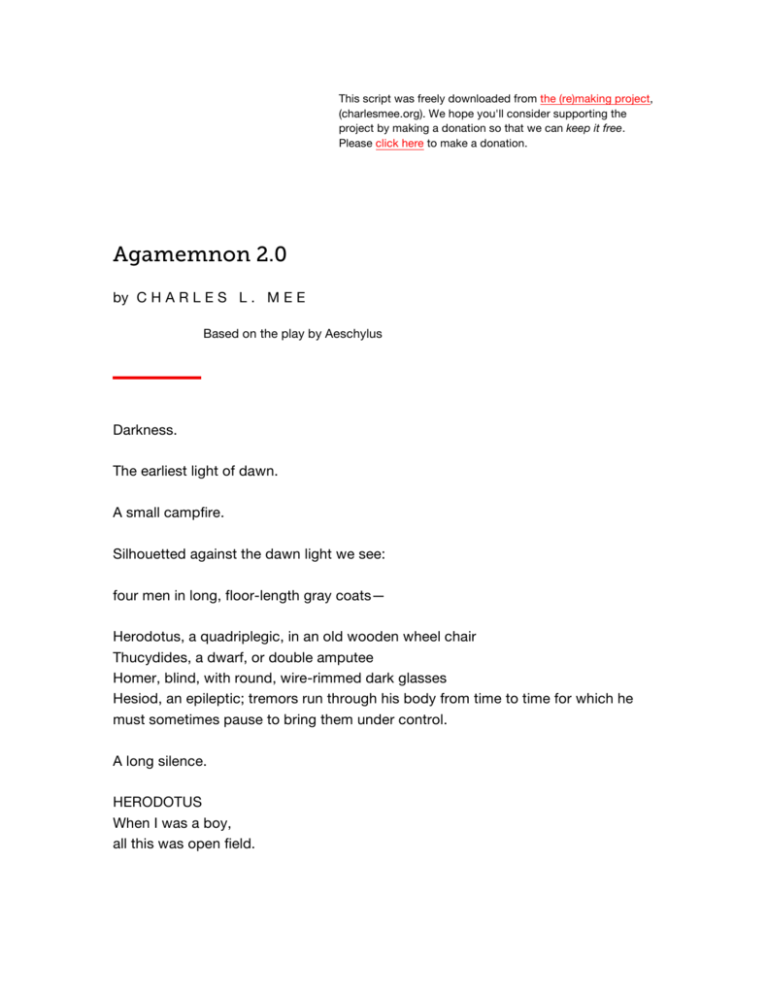
This script was freely downloaded from the (re)making project, (charlesmee.org). We hope you'll consider supporting the project by making a donation so that we can keep it free. Please click here to make a donation. Agamemnon 2.0 by C H A R L E S L . M E E Based on the play by Aeschylus Darkness. The earliest light of dawn. A small campfire. Silhouetted against the dawn light we see: four men in long, floor-length gray coats— Herodotus, a quadriplegic, in an old wooden wheel chair Thucydides, a dwarf, or double amputee Homer, blind, with round, wire-rimmed dark glasses Hesiod, an epileptic; tremors run through his body from time to time for which he must sometimes pause to bring them under control. A long silence. HERODOTUS When I was a boy, all this was open field. HESIOD There's some comfort in the memory of it. THUCYDIDES If it's true. HERODOTUS I was here. I know it to be true. THUCYDIDES What one remembers and what is true are so seldom the same. HERODOTUS These days, even now, you can look out from here and know which of these farms is recorded in the Domesday Book, and which of them came later. HESIOD [smoothing over the tension] Once, on this familiar spot of ground, walked other men and women, as actual as we are today, thinking their own thoughts, feeling their own passions now gone as utterly as we ourselves shall be like ghosts at cock crow. [Homer steps forward out of the darkness, the light catching his glasses.] 2 HOMER One time long ago not far from here the poet Simonides was gathered with his friends for dinner at a palace in the hills across this valley. Simonides stepped outside onto the terrace for a moment for a breath of air, and in that moment an earthquake shook the villa and brought it to the ground. All Simonides' friends were crushed to death, their bodies mangled and torn apart, not even their own families could recognize them. But Simonides could picture in his mind's eye just where each one of his friends had been sitting, and as he recalled them one by one their bodies could be pulled out from the rubble and identified. And from this moment came the beginning of mankind's desire to remember exactly how the world has been at one moment or another. And so Simonides instructed his friends how to build their own palaces of memory, how to build each room how to furnish these rooms with the faces and figures of their friends, events of their lives, their treasures, 3 books, poems, each room given things of singular beauty or distinctive ugliness, to make them vivid unforgettable memories disfigured, faces splashed with paint or stained with blood each moment suspended in this geometry of memory, thought and feeling. HERODOTUS Ten years ago, the sons of Atreus Agamemnon and Menelaus left this spot for Aulis where they sailed for Troy in search of Helen, stolen from her husband Menelaus and taken home to Troy by Paris. HESIOD Like any slave THUCYDIDES or piece of property. HESIOD It's a sort of love story— or a thousand love stories all knit up in one this story of these men and their love of entangling themselves with women take this one, leave the other at home, throw this one away, take another one instead, 4 rape this lot or murder all of these.... HERODOTUS One thousand ships An army of determined men Set forth to bring her back HOMER like fiends of hell HERODOTUS and to destroy the Trojans for the wrong they had done sheltering Paris even as he assaulted all trust that is the only true shelter of men and women in the world. THUCYDIDES And yet, these fiends of hell had miscalculated the winds and could not get their ships to sail HOMER They found the body of a pregnant hare HESIOD [trembling] and the prophet Calchas interpreted this portent for Agamemnon, saying if you would lead the children of other men to war to shed their blood then you be the first before any man's child is killed kill one of your own and then the ships may sail to Troy 5 THUCYDIDES And so he did. HESIOD [in anguish] And so he did. Summoned his wife Clytemnestra to Aulis, saying their daughter Iphigenia was to be wed to Achilles. Clytemnestra brought her daughter to the shore and there Agamemnon murdered her. [He trembles, so unsteady for a moment now that he must kneel on the ground.] HERODOTUS Caught in this dilemma between private love and public duty HESIOD A father's love and his lust for power— this meeting place of tender heart and a love of domination: Murdered her. HOMER An iron bridal feast. HERODOTUS And so brought a curse down on himself and on his army even as they sailed to victory. 6 THUCYDIDES The power of a public man is measured by how much blood and treasure he has the authority to waste. HESIOD I saw them sail. THUCYDIDES Not fit to sail with them but fit to stay at home and gossip HESIOD To tell their story over and over again until we understand it. HERODOTUS Ten years they've fought HOMER till now the rains wash away the battlefield and skulls rise up from the shallow graves so that both sides cry out for an end. [silence] HESIOD One time I found myself alone in midafternoon in a deserted village. I walked slowly through the streets among the empty houses. The village was overgrown with tall weeds and yet its buildings were intact. 7 But when I crossed under a dry stone arch, I stopped abruptly. I felt the presence of someone looking at me. I turned around. There was a woman on top of a towerhouse, out on an open terrace, dressed in black, and nailed down at the center unable to move one way or another. She was bent almost double halfway between standing and sitting rocking her body back and forth ever so slightly staring at the abandoned olive terraces the sun glaring off a thousand rocks. She had turned from that scene to look toward me. I greeted her, and I could not tell whether she nodded back at me or only moved her head with the rocking of her body an eternal clock sedentary and permanent suffering the curse of those caught in the eternal present unable to awaken. Sometimes when I am by myself I carry on a dialogue with the past, listening carefully for the voices of those who have left us. I touch the stones with their inscriptions of past fates inscriptions partially erased 8 yet still discernible. I call up the shades these silent bodies silent souls so they might feed on our compassion and I might learn the source of our present woes. [Clytemnestra enters. She is pale white, as the moon, white as a Butoh dancer, a complexion without blood, and with radiant blood red lips.] THUCYDIDES The queen. HERODOTUS Clytemnestra. CLYTEMNESTRA I dreamed last night a torch was lit on Mt. Ida— and Hephaestus, god of fire, hurled the light to Lemnos and from there to Athos, the fire flew from torch to torch mountaintop to mountaintop island to island across the sea like new stars or suns to Makistos Asopus Cithaeron Aulis 9 [silence] and from Aulis home to me. I love the clouds any clouds white, purple, black clouds rain clouds when they are driven by the wind a thin wisp of cloud across a bright moon the dark clouds of the early morning as they turn gradually to white What does this mean? THUCYDIDES What could it mean? CLYTEMNESTRA And then after the fire came home I dreamed we spread the bones out in the sunlight these bones were meant for questions of life and death They say: if someone's flesh still clings to their bones then they had done many bad things but these were clean bones pure white we brought them into the house in the afternoon and walked with them through room after room going backwards through the seasons many years until the house was still and we put them next to the hearth and there we heard them sing 10 These days, they say, men and women are afraid to sing the songs they know from childhood for fear they will die from a longing for the past. What does this mean? [The men turn away from her, except Hesiod.] HESIOD Today the Greeks hold Troy. THUCYDIDES What? HESIOD Troy has fallen. Greece has won. Our soldiers now are coming home. THUCYDIDES How do you know this? HESIOD I don't. The dreamer does. HERODOTUS There have been rumors... THUCYDIDES It could mean anything. This is a lot to know from the images of a fevered mind. CLYTEMNESTRA And this is the meaning then of all the rest: 11 that men and women run through the streets shouts both of happiness and of horror joy and sorrow mingle equally like vinegar and oil in one cup unreconciled. These are Greeks and Trojans, victors and their prey. Falling upon one another equal victims of their violence. How can one person bring himself to kill another? To take another human life. Snuff it out. This precious thing. Destroy it. Forever. I don't understand it. So, all that remains is the journey home. All that remains is the welcoming of the conquerors. Sometimes, the most disagreeable sights come unbidden to one's mind: a young woman, no more than thirteen years of age with some pain in her chest something that no one knows no one can identify it and yet it makes the girl lose all her appetite. Or a woman with sleeves of unequal length, it makes her look off balance somehow, one expects her to tilt right over fall to the ground you want to reach out or say to her 12 watch out! your hand comes up as though to say— something— and then, of course, you feel foolish when you were only trying to help. Or then again one time I wrote down a poem I had heard and left it on a table so that one of the maids picked it up and read it out loud so clumsily and I felt, however wrong it was to feel it, how devastating it is to hear a poem rattled off without any proper feeling. These words you sometimes hear a mother or a father to a child I love you, dear— just rattled off so that you think your heart could break or you could choke with rage. These times we live in an eternal present never an evening of peace. [Clytemnestra leaves.] HERODOTUS One time I dreamed that I had turned into the River Xanthus in Troy. 13 I bled for ten years, and still I didn't die, because the river is immortal. HESIOD [he fights against his trembling from time to time] To see a river in a dream is a bad sign ordinarily. Dead oxen even worse. Or black mares will signify a famine. A hare signifies an unlucky journey. The sight of doves bespeaks involvement. A mouse: propitious circumstances. To hold a sparrow struggling in your hand forebodes mischief. To swallow a bunch of grapes indicates rain. Withered trees: the uselessness of labor. HOMER There are times you will see a black maidenhair fern in shady places or sometimes near the trunks of trees on the banks of ditches in wet ravines on heaths or in the woods in turf bogs on the high rocks in the clefts of rocks on rotted wood or in a meadow each one of these has its own affect whether in a dream or in the waking world You might see two boys playing with a bird an old woman feeding a cat 14 HESIOD a navelled fig with wrinkled skin HERODOTUS a walnut just out of its green rind HESIOD a quince covered with fresh dew HOMER hour glasses HERODOTUS combs of horn buttons silk stockings of the colors of the orient shoes of Spanish leather rolls of parchment a bundle of tobacco HESIOD an orange gathered from the tree that grew over Zebulon's Tomb HERODOTUS a sitar birds nests from China HESIOD prisms HERODOTUS the complete head and body of Father Crispin buried long ago in the Vault of the Cordeliers at Toulouse; a stone taken from a vulture's head; a large ostrich egg on which is inscribed the famous battle of Alcazar in which three kings lost their lives; 15 HESIOD the skin of a snake bred from the spinal marrow of a man; HOMER jasmine narcissus HERODOTUS scarlet ribbons a toothpick case an eyebrow brush a pair of French scissors a quart of orange flower water four pounds of scented snuff a tweezer case— enameled an amber-headed cane a tailor's bill lessons for the flute an almanac for the year 1700 HESIOD petrified moss petrified wood Brazil pebbles Egyptian bloodstones hummingbirds pieces of white spar HOMER a piece of the stone of the oracle of Apollo THUCYDIDES Bucharest salami a Turkish powder horn a pistol HESIOD a giant's head 16 HERODOTUS a music box HOMER a quill pen HERODOTUS a red umbrella HOMER some faded thing handkerchiefs made of lawn of cambric of Irish linen of Chinese silk HESIOD and each one of these may make you wonder whether it signifies the past or the future or is only meant to fill you with a longing for such moments of life in the afternoon and the wish that they should go on forever. [The Messenger enters. He is filthy, in torn clothes. One arm gone. A foot wrapped in bandages. Dragging a large burlap bag.] MESSENGER Are you veterans? HESIOD Of the war? 17 MESSENGER Of the war in Troy. HESIOD No. HOMER Not of that war. THUCYDIDES You've returned from Troy? MESSENGER My ship was the first to land. There are some others with me. Not many. Some other boats went down. There was a storm. THUCYDIDES And King Agamemnon? MESSENGER He's on his way. HERODOTUS And Menelaus? MESSENGER I don't know. Like I said: some ships went down. Of course, I was only a cog in the wheel but I myself never mistreated a prisoner, far less killed one. 18 They left their cattle in the stables dinner on the tables Of course of those who had fallen not all were dead, some were clawing at their clothes or shrieking or crawling over the motionless bodies of those who were dead some spurting blood hands clutching at their torn flesh arms moving puppetlike We paused for a moment by the river of time, as they say, sucked the honey from the bone-marrow of some strangers and smeared it across their faces Stirred up some blood. And on the day of judgment my fellows and I who fought in this war will collect our scattered bones and submit them for roll-call, and we will be told to advance— and we'll do it! Man is spirit, but what is spirit? Spirit is the self, but what is the self? The self is a relation which relates itself to its own self, or it is that in the relation that the relation relates itself to its own self; the self is not the relation but consists in the fact that the relation relates itself to its own self. Man is the synthesis of the infinite and the finite, of the temporal and the eternal, of freedom and necessity. So regarded, man is not yet a self, but may become a self in relation to another, as in war. THUCYDIDES What a lie to say that fortune favors the bold. Fortune favors the cretins and the madmen. Fortune is on the side of the savages. 19 MESSENGER What would you know? Thrown into an army in the field a man is weaned from whatever excess of tenderness toward his precious person he may bring with him These are visions I can see at any time of night or day eyes opened or eyes closed Where there were houses we left rubble, smoldering woodpiles, ulcers festering on naked terrain. We smashed our way into crowds of men and women raging and beating and hunting; we drove them across the fields like frightened horses; we set fire to their houses; we hurled their corpses into wells; everything that came to hand we ruined; our hearts were emptied of human feelings; we burned whatever we could. There comes a time you can't distinguish the images of day from night. THUCYDIDES The body is nothing but a product of semen and of blood which then becomes a meal for death a dwelling place for suffering a tavern for disease. A man may know all this and yet from lack of judgment drowning in a sea of ignorance, he yearns for love, for women, and for power. 20 MESSENGER In the aftermath, one feels the chill in the countryside, the low-lying white mist, shards of farmhouses in the haze, shattered stones, no grass, no ruins, empty streets, and silence no living thing no bird, no animal broke the silence no dogs, no children, not one stone left standing on another, rather a wilderness of stones, even if one could trace it for a distance, there would be a danger of getting lost, because there is no sign of direction. HERODOTUS No one knew what was happening or why— those were the rumors we heard back home— or who had a chance to survive and who didn't where the safe places were who was born under a lucky star THUCYDIDES It's all very complicated. All a matter of the complicity of "all parties" a result of ancient feuds difficult to pin the blame. MESSENGER a light ash of gold covering the fields the victors covered in glory dust to golden dust 21 this is precious dust One had the impression of having passed out of the modern world back into a vanished civilization. The color of the dead: faces changed from white to yellow-grey, to red, to purple, to green, to black, to slick. So I've brought these things home [he opens a burlap bag, brings out battered, dirt-encrusted gold cups and/or rusted 19th century wagon wheels a broken glass of indeterminate age and other ruined precious or not-so-precious items from various epochs] And these words [handing a scroll to one of the chorus who unrolls it to read] to be inscribed in some public place: [he recites] The Argive army conquered Troy And brought home over land and sea These hard-won spoils, the pride and joy of ancient palaces, to be Trophies of victory, and grace the temples of the Hellene race 22 HERODOTUS The rumor we heard was that there is no longer a menagerie in the royal palace of Troy. That even those innocent animals were killed. MESSENGER I don't know anything about that. HERODOTUS The last grizzly bear has died, they say. MESSENGER I don't know anything about that. HERODOTUS They say that a few ponies are still wandering around in that no-man's land. But that most of them were caught and butchered. MESSENGER That's not true. HERODOTUS I've heard that someone saw a peacock and a white swan killed for no good reason at all. MESSENGER There are always rumors. By definition none of them are true. THUCYDIDES We are told there are witnesses to some of these things. MESSENGER Make of it what you will. For my part, I remember none of it. And as for me, and for my friends, we're finished— coming home, 23 stripped of whatever it was we had. Before, the quiet moments between battle were not moments of peace but periods of mounting tension anticipating their release— now there will be no release, just the waiting. Sensation is dead. Time rolls on—but it has lost whatever it had that was brilliant. [He leaves.] HERODOTUS Now at last the long war is over and the most pervasive feeling of those who fought is anxiety about the peace. THUCYDIDES They won't have long to wait. There's no such thing as peace. Peace is nothing but an armistice in a war that never ends. HOMER These wars: declared by old men who send their young to die HESIOD Clutching a weapon from the depths of sleep comes easily— 24 it's in our blood, the same gesture with which Ice Age man took hold of his ax of stone. HERODOTUS There was a time when you came indoors from the fields you would expect to see traces of human occupation everywhere; fires still burning in the fireplaces because someone meant to come right back; a book lying face down on the window seat; a paintbox and beside it a glass full of cloudy water; flowers in a cut glass vase; an unfinished game of solitaire; a piece of cross-stitching with a needle and thread stuck in it; building blocks or lead soldiers in the middle of the library floor; lights left burning in empty rooms. This was the inner life, not found in bare inscriptions, ancestral lists, great events. [They pull an old victrola from the detritus around them and play a section of Arvo Part's Te Deum. As the music plays, they sit or stand silently and listen.] Agamemnon enters. His hands and face are deeply stained with blood. His clothes are filthy and torn and stained with blood. He has a large hawser over his shoulder, and with it, he drags behind him 25 packing boxes, steamer trunks, other things containing the spoils of war. Many more spoils than the Messenger was entitled to. The glaring hot sun of midday. THUCYDIDES Agamemnon. HESIOD Like a ghost. HERODOTUS How does one address a vision such as this? With pity or with praise? HESIOD Why not say right out: ten years ago when you left for Troy we thought you were wrong. Misguided. Wrong. THUCYDIDES Those times are past. HERODOTUS Agamemnon. Welcome home. AGAMEMNON Thank you. I bring a conqueror's greeting to my home. We brought a just revenge to Troy. For the Trojans' rape of Helen we have made the city pay a woman's price. We have ground that city's bones 26 we have turned its walls to dust And even now smoke still rises to mark that great city's fall. Come face to face with what it is to be a man. HESIOD We were told that even innocent children were killed in this war— young girls even AGAMEMNON That's not true. Not to my knowledge. This is not something our men would have done. HERODOTUS We were told the men took pleasure breaking into private homes dragging women out into the streets and... AGAMEMNON That's not true. Perhaps one or two. War is a school of strenuous life. War is a school of heroism. THUCYDIDES I was told of one man who lifted a body that had fallen to the floor placed her on the couch she stretched out her arms to protect herself AGAMEMNON These stories are not true. I've heard such things myself. The world is a bleeding wound when it comes to that. 27 THUCYDIDES One conversation was quoted to me between a soldier and a woman. He said I'd like to hear your opinion as an artist. About what, she asked. About whether you have a perfect figure, he said. The story is he had insisted that she let her gown drop to the floor.... AGAMEMNON These are fictions made up by demented people All these stories that you hear What do you think is true? After all, The natural state of a man, the ecstatic state, will find itself in the visions of things that appear suddenly: cadavers, for example, nudity, explosions, spilled blood, sunbursts, abscesses, thunder. So much is undeniable. Everything that exists destroys itself when it comes to that. The sun in the sky like an orgy of frozen light, lost. Consuming itself and dying. The stars consuming themselves in an agony of fire. The joy of life that comes into the world to give itself and be annihilated. 28 Everything living and dead mortally wounded. Blood and open bodies. A human being can be thought of as a tree trunk on fire You can lay them down screaming on their stomachs or their backs— or you can spare the fire and lay them out on the beach nothing more than breathless lacerations shapeless silhouettes half eaten getting up or moaning on the ground then you might say the head— the eyes, the ears, the brain are the complications of the buccal orifice the penis, the testicles the female organs that correspond to these are the complications of the anal orifice. Thus one has the familiar violent thrusts that come from the interior of the body indifferently ejected from one end of the body or the other discharged, wherever they meet the weakest resistance as in war. HERODOTUS Everything that seemed impossible yesterday has become entirely possible today. AGAMEMNON One group of soldiers had caught a female ape from the menagerie tied up with ropes struggling to break free 29 but trussed up like a chicken legs folded back against her body tied upside down to a stake planted in the middle of a pit howling and swallowing dirt its anus screaming pink and pointing at the sky like a flower and all the men around the pit stripped naked for the work and sweating with pleasure and anticipation armed with shovels filling in the pit with dirt burying the ape alive its screams choked on the dirt until all that remains is the radiant flower of its anus touched by gentle white fingers its violent contractions helpless as it strangles on the dirt and all who stand around the pit and watch are overcome by heat and stupor their throats choked by sighs and crying out eyes moist with tears. HESIOD Who will pay for this? AGAMEMNON I don't think a girl can avoid thinking of her little rear end when she sees that anal baldness of the apes on the other side of the bars of a cage Take any war by itself it makes no sense. The meaning of any moment in history cannot appear all at once. 30 Only in the succession of moments can it become clear. One moment meaningful only in relation to the other moments before and after. We are at each instant only fragments deprived of meaning. The totality of time alone makes up and completes a human life. HOMER This is how men are. AGAMEMNON I can imagine the earth projected in space as it is in reality like a woman screaming, her head in flames. The demons may be women— as agents of destruction or trapdoors into nothingness— women as elements within the undirected streaming of pleasure that will kill— or they may be children In war one might take a child by its feet from its bed at night carry it out to the courtyard swing it round in an arc and smash its head against a tree Or take a girl from her mother's arms and tear her in half like a rag. These girls who look to you as they might look to their fathers innocent 31 begging eyes wide with trust and love Ladies should never fall in love. They become stars no one can ever reach. To look taller they cut their heads off and stand on them. Some fall in love with foreign accents and dark vowels. You see them late at night in taverns, talking with dangerous criminals Late at night, their voices are small animals waiting to be fed. It's a nightmare really. HERODOTUS When men go to war they invade their own homes first. HESIOD They murder first what's best in them. HERODOTUS A man can be completely immobilized by grief. AGAMEMNON One company of soldiers rounded up two hundred women took them to an empty slaughterhouse made them strip naked and get down on all fours like cattle they drove them forward to a ramp where they were 32 where the soldiers lashed out at them with knives and axes forcing them to keep crawling until they could crawl no more their torsos their arms and legs hacked off their headless torsos left to fall into the abyss below HESIOD After this everything is possible. AGAMEMNON But we have put all this behind us now. Now we look to the future. To the just rewards of peace. To the restoration of the civic order. The comforts of a secure home and family. The love of children. The fruits and labors of peacetime of building of nurturing our children of passing down to a new generation the values we all cherish. The mornings of shared expectation long afternoons of idle play of company in the evenings the pleasures of the table of polite conversation 33 delights of the mind of music and sweet sleep. A world restored. [Clytemnestra enters with blood red tapestries in her arms.] Agamemnon, my lord and husband. AGAMEMNON Clytemnestra. [silence. rigidity.] CLYTEMNESTRA There was a rumor that you had come back with another woman. But I see that it's not true. AGAMEMNON No. CLYTEMNESTRA Welcome home. What shall I tell you all at once of these ten years that you've been gone AGAMEMNON And what shall I... CLYTEMNESTRA Ten years alone with each day new rumors of your death each traveller bearing news 34 worse than the last. To see you now, my eyes fill with tears to know relief from all my sorrow is here within my reach at last So many times wavering between life and death I've been overwhelmed with despair And so our child is gone not standing here with us on your day of victory. Why do you start? I mean Orestes. Fearing unrest here at home if you did not return I sent him away where he would be safe. Of all the many things I find agreeable sometimes I think none is so comforting as when one has an upsetting dream and wonders what it can mean. In great anxiety one consults an interpreter of dreams and is told that it has no special significance at all. I've watched for you every night my eyes still burn with watching for you praying for your return I wept by the bed I kept for you alone In my dreams I saw this moment come I never let it die. My husband. Come. Come home with me. 35 Come to our bed, lie with me in my arms forever. But no. Wait. Don't put your foot on the naked earth. Come. Have the honor that is due to you. Walk into your home on these tapestries. I meant to write a poem welcoming you home something special that others would remember and copy down in their diaries. Though this is something that has never happened to me I can imagine how pleasing it must be. But even so, without a poem, walk into your home on these tapestries. AGAMEMNON Clytemnestra, my wife, thank you— for your compassion, your understanding, and your praise. I am exhausted and I would lie down. But, thank you: no red silks for me to walk on. This is an honor due the gods, not to me. What man should set his foot 36 on such rich treasures— woven by the hands of many women. Such pride is frightening to me. Honor me, please, as a man, not a god. CLYTEMNESTRA The sea is teeming with such dyes as these, you're no king of paupers, there are scores more silks like these within your house. Come. This one time. For this moment like no other in your life. Celebrate your coming home. AGAMEMNON Thank you, Clytemnestra, but I would rather come through the door with an easy mind. [She will try anything: seduction, flirtation, playfulness, humor.] CLYTEMNESTRA Indulge me just this once. AGAMEMNON Please. CLYTEMNESTRA If I would promise to undress you very carefully give you a bath wash the dust of travel from your body very slowly. AGAMEMNON Would you? 37 CLYTEMNESTRA If I would promise to wash your hair let you put your head back in my hands hold you there to rest AGAMEMNON You make it hard for me to refuse. CLYTEMNESTRA Bathe your tired eyes with my tongue. AGAMEMNON Well... CLYTEMNESTRA Put my tongue in your ear. AGAMEMNON [smiling] Really? CLYTEMNESTRA Or up your nostril. AGAMEMNON [laughing] You go too far! CLYTEMNESTRA If the Trojan king had won the war, what do you think he would have done? AGAMEMNON He might have walked on silks such as these. CLYTEMNESTRA Will you be humbler than the man you've beaten? 38 AGAMEMNON Yes, I might. Why be so insistent? Does it suit a woman to be so aggressive? CLYTEMNESTRA Does it suit a man to be so set against even the littlest desire of his wife? I think these red silks suit you. Then, too, does it not suit greatness to accept defeat with grace. And you, so accustomed to being victor in all things, have had so little opportunity to show this form of magnanimity and accept this honor I would give you. AGAMEMNON You have the persistence of a great soldier. CLYTEMNESTRA Yield to me. You the victor; give me my victory, too. AGAMEMNON Since you are so resolved. [to Clytemnestra] Here. Help me. Untie my sandals. If I am to walk across this deep-sea treasure, let me feel it on my skin. 39 [Clytemnestra takes off his sandals, then rises and takes his hand, and walks with him toward the house, he on the silks, she just off the edge.] CLYTEMNESTRA [calling out loudly, triumphantly] Here comes my husband King Agamemnon home! [Hesiod begins to tremble uncontrollably. He collapses to the ground thrashing in an epileptic seizure. The other chorus members rush to him to help. He speaks in fits and bursts— until the end, when he subsides somewhat, speaks more slowly, and finally is relaxed, and exhausted, in his final words.] HESIOD A wretched ghost— tears— and tears— the skin— then eats first the flesh strong and putrid shoulders buttocks backflesh tendons guts 40 and eyes. He bares his teeth and from the corpse upon his lap calmly eats the remnant to the marrow of its bones. [They turn to see Cassandra.] [Cassandra emerges from the packing boxes or from a steamer trunk. She is bleeding from the eyes wearing torn clothes. Late afternoon.] HERODOTUS What's this? CASSANDRA What are you accustomed to seeing in this port? Cargoes of gold, silver, precious stones and pearls? fine linen, purple silk and scarlet cloth every sort of citron wood and articles of every kind made of ivory cargoes of cinnamon and spice incense, myrrh and frankincense of wine and olive oil cattle and sheep horses and carriages the bodies and souls of men and of women. No more. The merchants of the earth will weep and mourn over this city. They will say: the fruit you longed for is gone from you. 41 Your country has become the home for demons. The merchants of the earth grew rich from your excessive luxuries and all the nations have drunk the maddening wine of your greed. But you do not realize that you are wretched, pitiful, poor, blind, and naked. Here I am! I stand at the door and knock! I am Cassandra, the daughter of the murdered King of Troy. If anyone hears my voice and opens the door I will come in and tell you what I see that is to come! Every sea captain and all who travel by ship and all who earn their living from the sea will stand far off When they see the smoke of her burning they will exclaim: Was there ever a city like this great city? They will throw dust on their heads and weep. The music of harpists flute players and trumpeters will never be heard in you again No workman of any trade will ever be found in you again The sound of a millstone will never be heard in you again The light of a lamp will never shine in you again The voice of bridgroom and bride will never be heard in you again 42 Your merchants were the world's great men By your magic spell all the nations of the world were led astray. THUCYDIDES What nonsense. CASSANDRA On your shores I saw four living creatures covered with eyes, front and back and I heard one of the creatures say in a voice of thunder Come! And I looked, and there before me was a white horse whose rider held a bow. And I heard the second creature say Come! And another horse came out fiery red with a rider carrying a sword And I heard the third creature say Come! And there before me was a black horse and its rider was holding a pair of scales And I heard the fourth creature say Come! and I looked, and there before me was a pale horse with a rider named Death 43 And these four were each given power over a fourth of the earth, to kill by sword, famine, plague, and by the wild beasts of the earth. THUCYDIDES What sort of person would think civilized men and women would give serious attention to this sort of wild superstition? HOMER There is more truth in poetry than in a mere rendering of the facts of any matter. THUCYDIDES That's nothing but a recipe for lunacy. CASSANDRA Now, look! Now I see children weeping whispering in the house vile plotting children butchered like lambs by their own elders Look what they carry in their hands: their own flesh, limb and rib and heart they hold; children made to herd their own mothers and fathers to the fires; in a mass grave: a boy, dressed in white, his face pressed to his mother's shoulder; a child screams, and from its mouth comes a bloody foam; infants taken from their mother's arms 44 and thrown head first, with awful force onto the road; a child swung round by a soldier its head smashed against a wagon wheel; bodies clinging so tightly together they can't be separated even after death; a bucket pulled up from a well half full of human eyes bones ground to powder and taken away in sacks thirty sacks a day the altar is prepared a hunting net made ready the treacherous water's poured, the bath is full she holds him in a trap made like a gown despairing hands reach out [Cassandra screams] She strikes! He crashes down! She has murdered him! Agamemnon is dead! Look: you. See what comes here to those who put their trust in earthly power to those who take their happy state for granted Here your country stands in ruin this masterpiece of the gods, brought down with all her towering beauty her massive walls her men and women secure in the comforts of their settled lives 45 the love of their children smoke rises up from every corner the country is looted even while it burns Could this never happen to you? Look on Troy, look on the House of Atreus and see on what uncertain ground the pomp of empire stands. Run, then, run to your own death don't live another moment if all you know to do is contribute to the pain. [She bolts and runs at full speed to join Agamemnon.] A SCREAM The doors fly open, and we see Agamemnon's dead body in a silver tub, and Cassandra's dead body across it. Clytemnestra holds a bloody knife. Nighttime. CLYTEMNESTRA I said many things to my husband I said I longed for him to return I said my eyes burned with watching for him I said I wept with joy to see him come home to me Every word I said was true And had I known you were bringing home this woman for your bed I'd have longed even more intently for your homecoming. 46 I only wish we had had a chance to talk to one another I wish you could have told me like a human being what brought you to murder your own sweet child. One day, her tears will catch up with you. How could a person kill another human creature? I think, of course, I know if any person does— and yet it remains, somehow, a complete mystery. It's a nightmare really. So now I've finished all I was called upon to do. And I only pray to the gods who persecute this House: now forget the past. It has no claim on us. We're done with it. Leave us alone. Oppress some other home. I ask nothing more. THUCYDIDES And do you think the gods have done with you? Now you are a murderer. CLYTEMNESTRA An executioner for justice sake. This man was a murderer, 47 sacrificing his own daughter to his ambition and his cowardice. Whose life was safe at home with a man who would murder his own defenseless daughter? I apologize for nothing. I beg no one for forgiveness. Do you think I don't know it was wrong? Unforgiveable. Although I beg forgiveness. I would cut his throat again. THUCYDIDES And be, yourself, a murderer. CLYTEMNESTRA What would you have had me do? Appeal to the courts? What court would conduct a fair trial? He was a hero. And anyway, I don't know what could bring a person to kill another human being! How could this be explained? What would have happened but that I would have been put in chains as a mad woman and he would have gone free to bring some new woman into my house. I have two other children Would they be safe? Where were you when this man destroyed every shred 48 of justice. That was your time to speak, not now. HERODOTUS What was true then is true today. When the fabric of the civic order is torn, no one is safe. This is how it has been, and ever will be. CLYTEMNESTRA Noble ideals. I share them. But they do not describe the world I live in or protect me from the man to whom I was married. There's no law that could explain the life I've come to live and the world in which I live it. THUCYDIDES Don't expect you can appeal now to some idea of justice or some other notion of the good to protect you from those who hate you. CLYTEMNESTRA Protect me? I need no protection now. I have my children. No one would touch me. [Aegisthus enters. He is a gigolo, and a homicidal maniac. He is naked and wears a sheet.] 49 AEGISTHUS What's all this bickering? This is a day of deliverance, a time for celebration, a time you can believe at last there is justice in the world. The gods do see to that. Agamemnon has paid the price at last for what his father did to mine. [Here follows history as vitriol, history as vengefulness. A nasty recital, filled with rage and hatred.] All of you know this was the punishment that was his due. His father Atreus drove my father Thyestes from this city. And when my father returned to make peace with Atreus, Atreus gave a banquet in Thyestes' honor. Only because I was an infant left at home was I myself absent from this feast. And for dinner Atreus served to Thyestes the bodies, chopped and cooked of my brothers, Thyestes' own two sons. Has ever a more unspeakable crime been committed? Was the House of Atreus— and its heirs to this monster's crown— to escape the consequences of this act? Was such horror simply to be forgotten? No. Never. 50 It was left to me to avenge my father against the House of Atreus. To take back this city from the heirs of Atreus. Now I am satisfied at last, I could die now seeing Agamemnon finally brought to justice. I could have killed him with hammering in his head I could have killed him driving nails into his chest I would have split him with an ax right up his buttocks I could have hung his torso from a meat hook The swift cutting of his throat was an act of euthanasia. Think no more about it. What's done is done. Let's not wallow in the past. Let's put all that behind us and move on. [And what follows is pornographic, not tender— or tender, and also pornographic.] Come, Clytemnestra. Come inside. I know how to soothe your anguish, make you forget. I know how to hold you my head on your breast fingers twined in your hair to kiss your breast caress it with my tongue I know how to slide my hand down to your thigh 51 let my fingers wander up inside you and with my hand thrust deep inside to talk with you that moment when whatever it is I ask you speak the truth to me as you have always done in these years past when Agamemnon was away. Come. I know how you would be comforted to feel the ache of longing the satisfaction of love. A hand slipped round your buttock coming to you from behind as though you were a girl again making love for the first time a thirteen year old in her father's arms Come with me then Come and come again. Let me hold you in my arms. If men and women knew true love, tenderness, trust, care, they would know true peace forever. [Clytemnestra turns and goes with him.] HESIOD All the things of the world come into being by themselves and so they are immortal. Life itself is eternal. But our individual lives have beginnings and ends. And this individual life 52 is distinguished from all other things by the rectilinear course of its movement, which cuts through the cycle of biological life. This is mortality: to move along a line in a universe where everything, if it moves at all, moves in cycles. And all things that owe their existence to men, all works, all deeds, all words, are perishable— unless men may endow these works and deeds with some permanence by making them forever memorable: and then these things may enter the world of everlastingness, and mortal men and women may find their place in the cosmos. This is the riddle of time: the human capacity to achieve remembrance is the capacity to transform time into eternity. Nothing human is forever; everything perishes; except the human heart that has the capacity to remember and the capacity to say: never again or forever. And so it is that our own hearts and nothing else 53 are the final arbiters of what it is to be human. [Music.] THE END . The text for Agamemnon 2.0 was written under the direction of Brian Kulick and with the assistance of Greg Gunter as dramaturg. Composed the way Max Ernst made his Fatagaga pieces at the end of World War I, some of the texts were inspired by or taken from the work of Hesiod, Herodotus, Thucydides, Homer, Aeschylus, Artemidorus, The Book of Revelations, Philip Vellacott, Slavenka Drakulic, Zlatko Dizdarevic, Zbigneiw Herbert, Pierre Klossowski, Georges Bataille, Sei Shonagon, and Hannah Arendt. Charles Mee's work has been made possible by the support of Richard B. Fisher and Jeanne Donovan Fisher. 54
